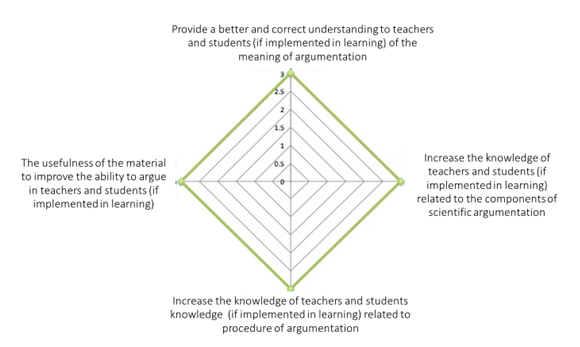Response of training participants in preparation of argumentative questions to train HOTS in Davao Indonesian school teachers
DOI:
https://doi.org/10.22219/jcse.v5i1.31149Keywords:
Quality education, Science Technology Engineering Mathematics , Teacher trainingAbstract
Higher-Order Thinking Skills (HOTS) can be trained through concepts in science learning generally, and biology in particular. Teacher competence to facilitate students skilled HOTS can be improved through scientific forums, one of which is training and workshops. This activity is an alternative for teachers to refresh their understanding and pedagogical skills and build enthusiasm through various modeling and information to generate motivation. Training activities on the preparation of argumentative questions to train HOTS for Davao Indonesian School Teachers of Philippines were held in two stages, the first stage was carried out synchronously through online meetings using Zoom Meeting, while in the second stage, training was carried out asynchronously using Google Classroom. Trainees' responses to the implementation of the training were netted with an online questionnaire using Google Form. The data were analyzed in a quantitative descriptive. The results of this study showed that all participants rated that the material presented by the resource persons was good, which included material on HOTS, STEM approaches, and argumentative thinking. In addition, participants also gave positive responses to the workshop on developing argumentative questions, the ability of resource persons, and the technical implementation of the training. Participants hope that this activity can be followed up with offline training.
Downloads
References
Apriono, D. (2013). Pembelajaran kolaboratif suatu landasan membangun kebersamaan dan keterampilan kerjasama. Diklus, Jurnal Pendidikan Luar Sekolah, 17(1), 292-304. https://journal.uny.ac.id/index.php/diklus/article/view/2897
Burns, M., Pierson, E., & Reddy, S. (2014). Working together: How teachers teach and students learn in collaborative learning environments. International Journal of Instructio, 7(1), 17-32. https://eric.ed.gov/?id=EJ1085240
White, D. W. (2014). What is STEM education and why is it important? Florida Association of Teacher Educators Journal, 1(14), 1-9. http://www.fate1.org/journals/2014/white.pdf
Direktorat Jenderal Pendidikan Anak Usia Dini. (2020, Januari). Data pokok pendidikan. Retrieved from https://dapo.kemdikbud.go.id/sekolah/D0CF918A7EA7150AD02F.
Driver, R., Newton, P., & Osborne, J. (2000). Establishing the norms of scientific argumentation in classrooms. Science Education, 84(3), 287-312. doi:https://doi.org/10.1002/
Haleem, A., Javaid, M., Qadri, M. A., & Suman, R. (2022). Understanding the role of digital technologies in education: A review. Sustainable Operations and Computers, 3(1), 275-285. doi:https://doi.org/10.1016/j.susoc.2022.05.004
Haouas, T., & Bouakaz, A. (2018). Students’ perceptions and attitudes towards the use of social media in enhancing English Language learning. (U. O. Baudiaf-M'sila, Ed.) Retrieved from The case of second year LMD students at M’sila University department of English: http://despace.univ-msila.dz:8080/xmlui/bitstream/handle/123456789/7721/2018-005.pdf?sequence=1&isAllowed=y
Kaya, E., Erduran, S., & Cetin, P. S. (2010). High school students’ perceptions of argumentation. Procedia Social and Behavioral Sciences, 2(2), 3971–3975. https:10.1016/j.sbspro.2010.03.625
Lee, S. S., & Hung, D. (2012). Is there an instructional framework for 21st century learning? Creative Education. Science Research, 3(4), 461-470. https://doi.org/10.4236/ce.2012.34071
Menashy, F., & Zeena, Z. (2023). Partnerships for education in emergencies: The intersecting promises and challenges of SDG 4 and SDG 17. International Journal of Educational Development, 103, 1-4. https://doi.org/10.1016/j.ijedudev.2023.102934
Muchtar, A. B., & Lin, D. (2023). Integrated STEM education in Indonesia: What do science. Jurnal Pendidikan Sains Indonesia, 12(1), 232-246. https://doi.org/10.24815/jpsi.v12i1.35588
Permana, T. I., Fatmawati, D., Nuryady, M. M., Fahlevy, I. R., & Ardiansyah, I. (2023). Scientific writing: A way to improve students’ information literacy and reasoning ability. Journal of Community Service and Empowerment, 4(2), 319–325. https://doi.org/10.22219/jcse.v4i2.25167
Ramirez-Montoya, Castillo-Martínez, I. M., Sanabria-Z, J., & Miranda, J. (2023). Complex thinking in the framework of education 4.0 and open innovation—A systematic literature review. Journal Open Innovation: Technology, Market, and Complexity, 8(4), 1-15. https://doi.org/10.3390/joitmc8010004
Rizqi, R., Prabowo, P., & Kirana, T. (2020). Development of OCIPSE learning model to increase students’ scientific creativity in natural science learning. IJORER: International Journal of Recent Educational Research, 1(1), 1-18. https://doi.org/10.46245/ijorer.v1i1.10
SID. (2023). Sekolah Indonesia Davao. SID. Davao City: https://sid.sch.id/tentang-sid/. doi:https://sid.sch.id/tentang-sid/
Singh, J., Steele, K., & Singh, L. (2021). Combining the best of online and face-to-face learning: Hybrid and Blended Learning Approach FOR COVID-19, post vaccine, & post-pandemic world. Journal of Educational Technology, 50(2), 140-171. doi:https://doi.org/10.1177/00472395211047865
Sudiran, S., & Adityo, A. (2023). Teachers assistance of Google for education in supporting education 4.0. Journal of Community Service and Empowerment, 4(2), 220–228. https://doi.org/10.22219/jcse/v4i2.26181
Tasgin, A. & Cigdem, D. (2023). The mediating role of critical thinking dispositions between secondary school student’s self-efficacy and problem-solving skills. Thinking Skills and Creativity, 5, 1-11. doi:https://doi.org/10.1016/j.tsc.2023.101400
Toulmin, S. E. (2006). Reasoning in theory and practice. In Arguing on the Toulmin; New Essays in Argument Analysis and Evaluation (Vol. 10 Series Editors). (B. V. David Hitchcock, Ed.) Netherlands: Springer.
Vijayanti, V., Cari, C., Sunarno, W., & Prasetyo, Z. K. (2016). Pemberdayaan keterampilan argumentasi mendorong pemahaman konsep siswa. Jurnal Penelitian Pembelajaran Fisika, 7(1), 43-48. doi:https:10.26877/JP2F.V7I1.1152
Widhi,W., Wulansari, N. I., Admoko, S., Hakim, A. R., & Solahuddin, M. I. (2021). Analisis keterampilan argumentasi ilmiah peserta didik pada model pembelajaran berbasis Toulmin’s Argumentation Pattern (TAP) dalam memahami konsep fisika dengan metode library research. PENDIPA Journal of Science Education, 5(1), 79-91. doi:https://doi.org/10.33369/pendipa.5.1.79-91
Wahyuni, A. S. (2023). Delivering online community service from community perspective: A critical review . Journal of Community Service and Empowerment, 4(3), 486-491. https://doi.org/10.22219/jcse.v4i3.27903

Downloads
Published
How to Cite
Issue
Section
License
Copyright (c) 2024 Rinie Pratiwi Puspitawati, Fida Rachmadiarti, Widowati Budijastuti, I. Isnawati, Reni Ambarwati, Pramita Yakub, Indra Tejamukti

This work is licensed under a Creative Commons Attribution-ShareAlike 4.0 International License.












